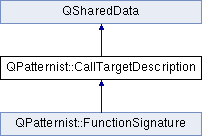 |
Qt 4.8
|
 |
Qt 4.8
|
Contains metadata for a callable component, such as a function or template. More...
#include <qcalltargetdescription_p.h>

Public Types | |
| typedef QList< Ptr > | List |
| typedef QExplicitlySharedDataPointer< CallTargetDescription > | Ptr |
Public Functions | |
| CallTargetDescription (const QXmlName &name) | |
| QXmlName | name () const |
 Public Functions inherited from QSharedData Public Functions inherited from QSharedData | |
| QSharedData () | |
| Constructs a QSharedData object with a reference count of 0. More... | |
| QSharedData (const QSharedData &) | |
| Constructs a QSharedData object with reference count 0. More... | |
Static Public Functions | |
| static void | checkCallsiteCircularity (CallTargetDescription::List &signList, const Expression::Ptr expr) |
Static Private Functions | |
| static void | checkArgumentsCircularity (CallTargetDescription::List &signList, const Expression::Ptr callsite) |
Properties | |
| const QXmlName | m_name |
Additional Inherited Members | |
 Public Variables inherited from QSharedData Public Variables inherited from QSharedData | |
| QAtomicInt | ref |
Contains metadata for a callable component, such as a function or template.
CallTargetDescription can be used directly and is so for templates, but can also be sub-classed which FunctionSignature do.
Definition at line 80 of file qcalltargetdescription_p.h.
Definition at line 84 of file qcalltargetdescription_p.h.
Definition at line 83 of file qcalltargetdescription_p.h.
| CallTargetDescription::CallTargetDescription | ( | const QXmlName & | name | ) |
Definition at line 50 of file qcalltargetdescription.cpp.
|
staticprivate |
Helper function for checkCallsiteCircularity(). If C++ allowed it, it would have been local to it.
Definition at line 60 of file qcalltargetdescription.cpp.
Referenced by checkCallsiteCircularity().
|
static |
Flags callsites to be aware of their recursion by calling UserFunctionCallsite::configureRecursion(), if that is the case.
expr by value here intentionally. Definition at line 72 of file qcalltargetdescription.cpp.
Referenced by checkArgumentsCircularity(), and QPatternist::yyparse().
| QXmlName CallTargetDescription::name | ( | ) | const |
The function's name. For example, the name of the signature fn:string() as xs:string is fn:string.
Definition at line 55 of file qcalltargetdescription.cpp.
Referenced by QPatternist::FunctionSignature::displayName(), QPatternist::UserFunctionCallsite::isSignatureValid(), QPatternist::FunctionSignature::operator==(), and QPatternist::ErrorFN::signature().
|
private |
Definition at line 111 of file qcalltargetdescription_p.h.
Referenced by CallTargetDescription(), and name().